- News
- Reviews
- Bikes
- Accessories
- Accessories - misc
- Computer mounts
- Bags
- Bar ends
- Bike bags & cases
- Bottle cages
- Bottles
- Cameras
- Car racks
- Child seats
- Computers
- Glasses
- GPS units
- Helmets
- Lights - front
- Lights - rear
- Lights - sets
- Locks
- Mirrors
- Mudguards
- Racks
- Pumps & CO2 inflators
- Puncture kits
- Reflectives
- Smart watches
- Stands and racks
- Trailers
- Clothing
- Components
- Bar tape & grips
- Bottom brackets
- Brake & gear cables
- Brake & STI levers
- Brake pads & spares
- Brakes
- Cassettes & freewheels
- Chains
- Chainsets & chainrings
- Derailleurs - front
- Derailleurs - rear
- Forks
- Gear levers & shifters
- Groupsets
- Handlebars & extensions
- Headsets
- Hubs
- Inner tubes
- Pedals
- Quick releases & skewers
- Saddles
- Seatposts
- Stems
- Wheels
- Tyres
- Health, fitness and nutrition
- Tools and workshop
- Miscellaneous
- Cross country mountain bikes
- Tubeless valves
- Buyers Guides
- Features
- Forum
- Recommends
- Podcast
TECH NEWS
Genesis reveals updated Volare steel frame with new tapered head tube
Genesis has updated its Volare steel race-ready bike with an updated Reynolds tubeset, featuring a new externally tapered head tube, and the Madison-Genesis professional race team are currently putting the 6th generation frame through its paces in the Tour de Normandie at the moment.
Genesis has exploited its close partnership with Reynolds to develop the Volare, which first appeared in 2013, and refine over the years. Feedback from the race team has helped hone the frame, early versions were too stiff, and the weight has been reduced as well, but the basic DNA - oversized steel tubes - carries through in this latest version.
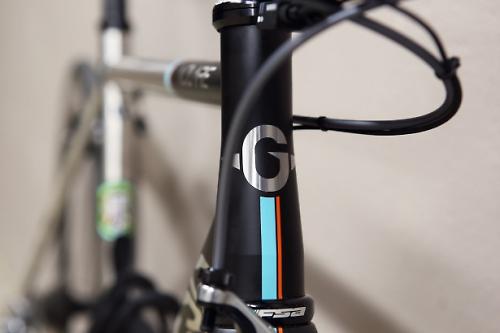
One of those signature features of the first prototype was a 44mm head tube, used at a time when few other frame manufacturers were adopting the same oversize head tube. The latest frame switches to an all-new head tube. It’s externally tapered, with a 44mm lower diameter and 34mm upper. It’s still compatible with tapered steerer tubes, but the new head tube uses the minimum diameter required to provide clearance around the steerer tube. The result is that it’s lighter. It’s also better looking too.
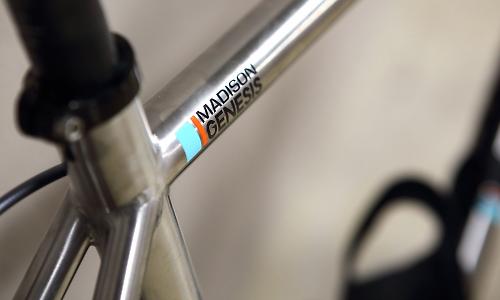
That’s not all. The top tube is brand new, and is the result of working with Reynolds to develop a brand new top tube just for this new frame.
“The lovely part of working with Reynolds is that if they don’t have the tube you’re after they almost certainly have the know-how and tooling to produce it,” says Genesis designer Albert Steward.
He adds: “Our new toptube in question started off life as a stock Ø31.8mm (0.6/0.4/0.6mm), whereby it was ‘sunk-down’ to a smaller Ø28.6mm diameter – a process involved drawing the tube through a new, smaller die and corresponding mandrel. The 28.6mm was then flat ovalised in its entire length (31.8/25.4mm) with the premise of boosting in-saddle comfort and dropping weight.”
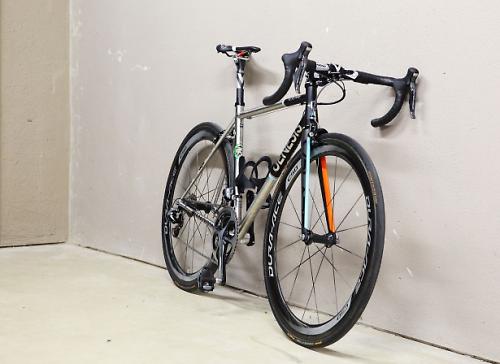
The new top tube with its flat oval profile provides the bike with a more slender side-on appearance compared to the previous frame. The down tube carries over, with an oval-round 36.4mm profile. There’s the same 24mm round-oval-round chainstays and a PressFit 86.5mm bottom bracket shell.
“Working with the Genesis designers has always been interesting as they challenge us to refine the initial concepts, using feedback from the Madison-Genesis Team,” adds Keith Noronha at Reynolds. “This is a very useful way to correlate theoretical properties from an engineering viewpoint, and turn them into a race-winning application. The Reynolds production people will fascinated to see how the 2015 frame developments transpire and prove steel still has a competitive place in the pro peleton.”
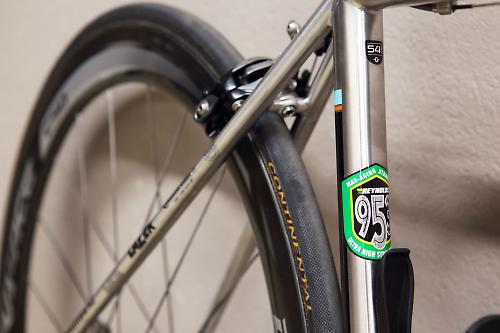
We don’t have a weight for the new frame yet, but as soon as the team get back from the Tour de Normandie, Albert has said he’ll weigh a frame and let us know. The previous version was about 1,500-1,600g for a size 56cm, so the head tube and top tube changes should contribute to a reasonable weight saving.
As well as the changes to the tubing, the Volare gets a fresh new paint job for 2015, the work of new graphic designer, Gary Rough.
“With the application of a modern graphic layout to what is often seen as a classic material, I believe we have created something that is not only visually striking, but also able to stand out from the competition in the peloton,” says Gary. “By using the pop of the MGT colour palette and a matt black paint to cover the forequarter we can allow the steel to do what it does best and look beautiful without compromising on weight and most importantly, style.”

The team are racing a Reynolds 953 frameset, but the tubing changes will be replicated in both Reynolds 931 and 853 for the upcoming 2016 production frames. The Reynolds 853 tubes are made by Reynolds in Birmingham specifically for Genesis, the 853 down tube is based on a 38.1mm ProTeam 853 down tube, while the 931 tubes are manufactured in Taiwan.
The release of the updated Volare shows that Genesis are still committed to steel as a viable material for professional racing. The reemergence of steel as a credible race bike material choice was a big part of the Madison-Genesis team launch several years ago, and despite the launch last year of the company's first carbon race bike, the Zero, the company, and the team, are still fully embracing steel as a viable race bike option.The team have the freedom to choose whichever frame they want, so they can pick the bike to suit the demands of any race they’re competing in.
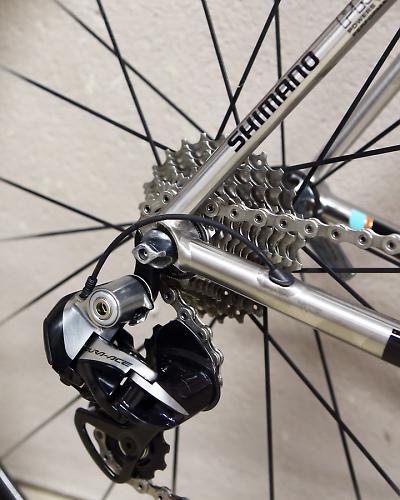
“I think the Volare suits the heavier, more powerful riders like Tom Skully and Tom Stewart especially on short, punchy crit courses where stiffness and handling trump lightweight,” adds Albert Steward. “The lighter riders naturally favour the lighter Zero (they always seem to [be] weight weenies) and obviously the lighter Zero comes into its’ own on longer stage races.
I tested the Volare 953 Team race bike last year and was really impressed, finding it very fast and inspiring to ride with great handling. I can’t wait to swing a leg over the latest version to see how it performs.
Find out more here www.genesisbikes.co.uk and you can see how the team are getting on in their race at their official website www.madisongenesis.co.uk
David worked on the road.cc tech team from 2012-2020. Previously he was editor of Bikemagic.com and before that staff writer at RCUK. He's a seasoned cyclist of all disciplines, from road to mountain biking, touring to cyclo-cross, he only wishes he had time to ride them all. He's mildly competitive, though he'll never admit it, and is a frequent road racer but is too lazy to do really well. He currently resides in the Cotswolds, and you can now find him over on his own YouTube channel David Arthur - Just Ride Bikes.
Latest Comments
- Pub bike 14 min 32 sec ago
The solution to the "issue" of no outer with suspension forks is obviously just to lock them out. This is no doubt why the lock-out function...
- stonojnr 24 min 37 sec ago
Could make a crass joke about how youre only supposed to flip pancakes today, but i wont...
- Secret_squirrel 40 min 12 sec ago
So who's funding this judicial review? Follow the money road.cc.....
- qwerty360 51 min 9 sec ago
I can accept this under one condition:...
- Mr Anderson 59 min 41 sec ago
I wouldn't worry too much about the locks being picked, in nearly all cases of bike theft, those Ninja moped gangs, the only things they can pick...
- brooksby 1 hour 17 min ago
They want to pick on The Others in general, rather than a specific group. Immigrants can hate Others just as much as Nigel Farage does.
- don simon fbpe 1 hour 21 min ago
There's no doubting how bad the sport must have been when a banker feels moral enough to criticise...!
- mdavidford 1 hour 23 min ago
I don't think they've come in from that end at all - all three approaches are bollarded, and I don't think there's room to get through. I think...
- chrisonabike 1 hour 54 min ago
More clearance damnit!!!








Add new comment
31 comments
For me, the choice to ride a steel bike is primarily about aesthetics and wanting something that will last. You are never going to compete with carbon on weight, but that doesn't really bother me.
To my eye, even the nicest of carbon frames just don't have that "wow" factor.
Older steel frames with the wrong set on the rear can be cold set by frame builders my 1960 holdsworth was cold set and a flat put in the chainstay for double chainring set up and now runs campy chorus 9 speed
Chasseur: That's pretty amazing. How did you get a 10 speed into a 30yo old frame? A 130mm hub into a 125mm or even 120mm spaced frame? That's a lot of bending!
That makes me think my next "new" bike should be an old high-end steel frame with modern light-weight components. (Though, first I have to find early 80s Campag groupset to replace the mid-80s "upgrade" Campag bits on my early-80s vintage Italian bike ).
).
It's steel so it doesn't need too much manipulation. The frame was 125mm, a bit of careful expansion and it takes 130mm no problems with the frame still perfectly in track. I've seen 120mm expanded to 130mm with the old plank of wood trick with no adverse effects but mine didn't need that. It's a Tommasini frame which I added a Columbus carbon front fork to, it looks amazing, rides amazing and gives my more expensive, modern carbon a serious run for their money. In fact, it's the bike I've used most so far this year.
Trying to big up steel frames by weight in the current cycling market is simply foolish. Steel cannot compete with carbon in terms of weight, so quoting ever lighter steel frames is a cul-de-sac.
Steel frames should be sold in a different way...
Actually here's an even lighter steel frame. 1475g in medium.
http://gosforth.cc/store/gosforth-reynolds-931
Pleased to see that they actually post the frame weight, most steel frame builders are very coy about it.
Mind you, a Colnago Master X-light from the 1990s is around 1650g in 55cm so there's not been a lot lost in the last 25 years.
@darrenleroy there are some VERY light steel frames coming from Italy, have a look at this:
http://www.dedacciaistrada.com/EN/acciaiozeroreplica.htm
1580g in steel!
Sweet!! Will there be a version with a level top tube? That would make it perfect!
There's a 931 and a 953 version both in compact sizes (S, M, L, XL) for now. The 931 geometry is lower and longer, while the 953 is a bit more relaxed.
Frame weights for a Medium are around the 1600g mark, but there's full details on the website.
Hopefully we'll have a Columbus XCR version in the with a horizontal top tube in the late summer/early autumn if there is enough interest.
I have steel bikes, I have carbon bikes. I prefer my old steel ones. I would love to get one of these. I can picture it with Super Record & Bora wheelset. Mmmmmmmmmm!
Stunning. Would love one of these.
Love this frame, and the concept too. But I can't see pro racers opting for steel over carbon.
darrenleroy: 16 lbs / 7.2 kgs might be asking too much. However, you can get 9.4 kg / 19 lbs steel bikes often for a lot less than £3k if you're willing to get an old, high-end race bike. Though, you may need to be satisfied with fewer gears and friction shifters (still great for training IMO).
You can do way better than that. I've got a 30 year old Columbus SLX frame built up with modern campy 10 speed and Shamals that weighs 8.5. Total build cost was £1350.
The carbon frameset also appears to be half the price of the 953 one too! I prefer the steel, but would need a windfall to buy one.
I agree. At only £1.1k for a pro-level frame set it simultaneously makes the £4.5k Zero Team look too expensive, and the £1.3k Zero.1 (complete bike!) look way too cheap! With the same frame across the whole Zero range, I predict that people will either by the frame and spec it up themselves for less money, or go for the Zero.1 which they can ride immediately and upgrade when funds allow.
Genesis have pulled out all the stops with this one. I agree heavier riders do seem to benefit from steel bikes more so than lighter ones. Just wish i could afford one.
www.tinpony.co.uk/shop/
Lovely bike, but I'm sorry: a straight headtube looks much better. Save the swoops and tapering for carbon bikes.
That is a beautiful bike.
(I agree with the Campag comments though! )
)
I thought this year the team were racing on carbon - all the photos from the tour de Normandie certainly show them on carbon bikes.
I do want one of these, though
I'm also confused by this and I'm a Genesis dealer!
A pro team riding bikes of steel from a British company with such a storied history (Reynolds make tubing for Spitfire in WWII!!) was the most amazing unique selling point in my opinion.
My understanding is that - after a period of swapping between the steel Volares and carbon Zeros depending on the race parcours - they now ride exclusively carbon.
This is a real shame in my opinion as the steel is so beautiful, but it's difficult to argue with a world class frame that is 5-600g lighter
Apparantly they will use the steel frame for crits and the like, while saving the carbon for stage racing!
Wanted: Steel framed cycle that weighs in at around 16lbs for a 53-54cm frame for under £3,000. This bike is inspiring. But I want the impossible.
Are you willing to build it up from a frame yourself..
http://gosforth.cc/store/gosforth-reynolds-953
Does need Campag - I'm waiting to see what they do with the 853 version for us mere mortals!
Likely to be frame-only so total build freedom
needs campag
Cannot afford one, but...
AAAAAhhhhhhh
That is one good looking bike.
Yes, it certainly is a looker.
Beautiful Bke
Pages